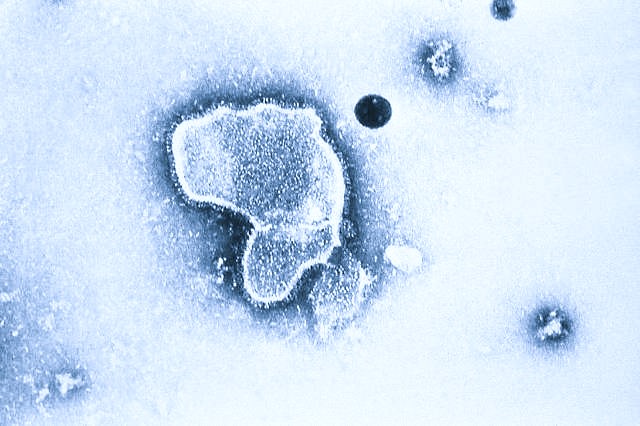Moderna succeeds in the pivotal trial of RSV vaccine
- An mRNA-based vaccine against respiratory syncytial virus (RSV), causing severe lower-tract respiratory infections, succeeded in a Phase III clinical trial conducted in elderly subjects. This success follows the recent approval of other RSV vaccines from GSK and Pfizer (both protein-based).
- Vaccine efficacy was 83.7% against RSV-related lower respiratory tract disease with at least two symptoms. No major safety concerns emerged during almost 4 months of follow-up. The duration of protection remains to be established.
- Owing to the aging population in Western societies, the burden of RSV disease is expected to increase over the next decades. It is hoped that the use of RSV vaccines along with influenza and COVID-19 immunization campaigns will further mitigate the morbidity and mortality of elderly people during the winter seasons.
A new RSV vaccine developed by Moderna, mRNA-1345, reduced the incidence of lower respiratory tract infection caused by this virus. This is the main conclusion of a large clinical study on elderly subjects published recently in New England Journal of Medicine. The reported trial enrolled a large cohort of elderly patients (35,541 participants) vaccinated with either active vaccine or placebo. After nearly 4 months of follow-up, patients receiving mRNA-1345 had 83.7% lower chance of experiencing the primary outcome (RSV-associated lower respiratory tract disease with at least 2 symptoms). Efficacy against any RSV-associated illness was 68.4%. Moreover, among participants experiencing the primary outcome, a lower incidence of fever and of shortness of breath were reported among mRNA-1345 recipients than among placebo recipients. The RSV vaccine appeared to be safe during the 4 months of follow-up. Most of adverse events were acute local or systemic reactions. Low number of subjects experienced severe reactions and serious adverse events were almost identical between vaccine and placebo arm.

Respiratory syncytial virus (RSV) as seen under the electron microscope.
Major limitation of the reported trial is a limited follow-up (112 days), as the publication relies upon interim results, produced after accrual of 50% of target events. Therefore, it is not known how long the protection will last or if a single dose is sufficient to maintain it at an acceptable level. Long-term follow-up will also clarify if vaccination leads to reduction in all-cause lower respiratory tract infections, not only those caused by RSV.
The new Moderna product continues the successful march of mRNA platform to become one of the primary technologies for vaccine development and manufacturing. Following the massive deployment of mRNA vaccines during the COVID-19 pandemic, their manufacturers turned attention to other important pathogens, including RSV, cytomegalovirus and influenza. An impressive number of investigational vaccines are currently in Moderna’s pipeline. However, with regards to the RSV vaccine, the company will have to withstand the competition from other manufacturers, which reported similar results to mRNA-1345. One of the competitors of mRNA-1345 is Arexvy, developed by GSK, which contains RSV F glycoprotein antigen (RSVPreF3) combined with proprietary AS01E adjuvant. The second one is Abrysvo from Pfizer, which is also based on RSVPreF3 protein. Unlike Arexvy, Pfizer’s vaccine is not adjuvanted, however it incorporates RSVPreF3 from two RSV types in a bivalent formulation, which might provide a broader protection against all viral strains (so far, this hasn’t been substantiated by clinical evidence, but future real-life observational studies may show advantage). Both Arexvy and Abrysvo have recently obtained the FDA approval.
Despite the advent of new technologies such as mRNA or adenoviral vectors, classic inactivated and protein-based vaccines are still a cornerstone of infectious disease prevention. Interest in their development remains unabated, in part due to the advent of novel, highly immunogenic adjuvants. A good example, in addition to AS01E adjuvant in Arexvy, is Matrix-M, which is used in Nuvaxovid, a COVID-19 vaccine developed by Novavax. The company is now working on Matrix-M containing vaccine for influenza and combined COVID-19/influenza vaccine. In face of the aging population, the problem of RSV prevention becomes more important with each passing year. The availability of RSV vaccines is highly welcomed by medical profession, as they are expected to sharply reduce the burden of respiratory diseases in older people. Their use alongside influenza and COVID-19 vaccines during the winter immunization campaigns would give protection against the three main respiratory pathogens, which each year are responsible for millions of premature deaths.
Prepared by:
References
- Wilson, Eleanor, et al. “Efficacy and Safety of an mRNA-Based RSV PreF Vaccine in Older Adults.” New England Journal of Medicine 389.24 (2023): 2233-2244.
- Moderna mRNA pipeline. Link: https://www.modernatx.com/research/product-pipeline.
- Lei, Jiayao, et al. “HPV vaccination and the risk of invasive cervical cancer.” New England Journal of Medicine 383.14 (2020): 1340-1348.
- GSK press release. “US FDA approves GSK’s Arexvy, the world’s first respiratory syncytial virus (RSV) vaccine for older adults” (03 May 2023). Link: https://www.gsk.com/en-gb/media/press-releases/us-fda-approves-gsk-s-arexvy-the-world-s-first-respiratory-syncytial-virus-rsv-vaccine-for-older-adults/.